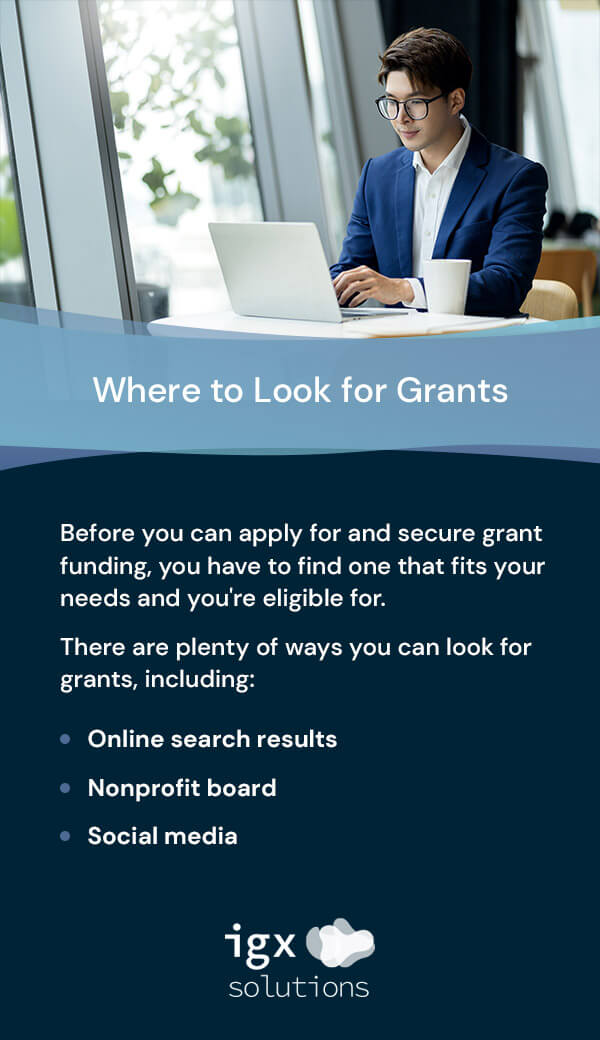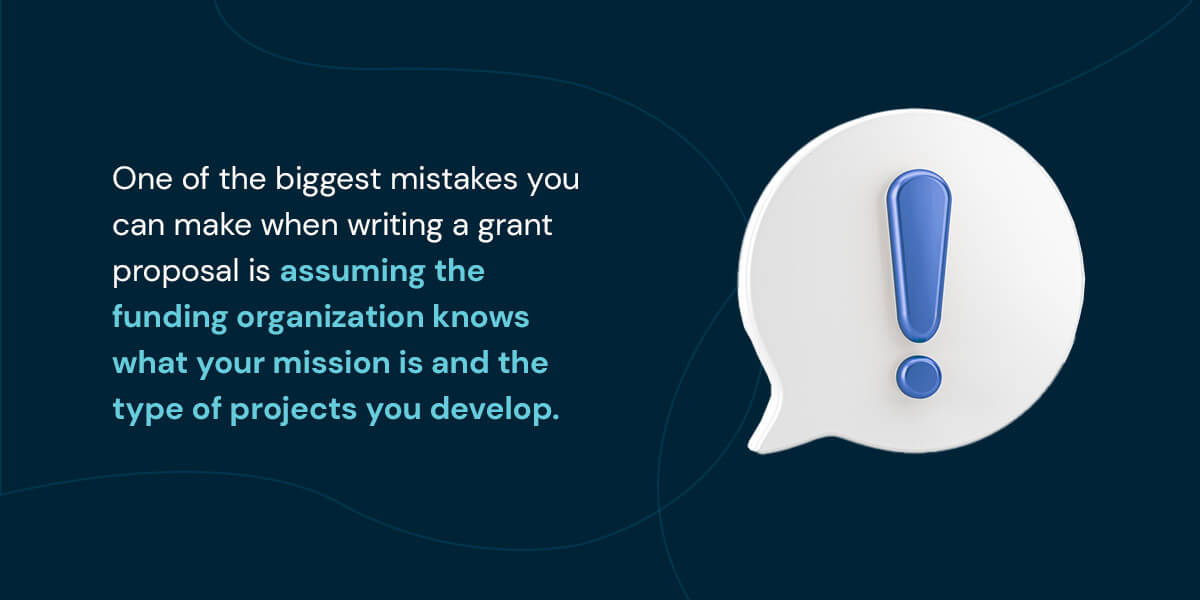Consider what your nonprofit wants to accomplish in the next few months or calendar year. What will you need to move forward with those missions? Be sure to account for which of these potential projects will be easy for funders to agree to.

Table of Contents:
Receiving a nonprofit grant is a multi-step process. Let’s look at how nonprofit grants work and the different stages your organization must go through before you can successfully secure a grant.
The first step to obtaining grant funding is to search for nonprofit grant opportunities that fit your organization’s needs and could help you accomplish your planned goals. Remember, nonprofits rarely apply for grants that don’t serve a specific purpose.

Before you jump into the search, begin by analyzing your organization’s objectives, needs and any aspects of your mission that may require additional funding. Narrowing down the grants you’ll apply for makes the process easier for both you and the funders involved in the grant process.
When you’re ready to begin your nonprofit grant management process, you’ll need to:
Consider what your nonprofit wants to accomplish in the next few months or calendar year. What will you need to move forward with those missions? Be sure to account for which of these potential projects will be easy for funders to agree to.
Once you have your goals, break down what you’ll need to bring these ideas to life so you can determine a rough cost for your funders. For instance, instead of vaguely saying your nonprofit wants to “feed the hungry,” write down the cost of the food, delivery, transportation, venue and staff needed for the project.
Because grants have different timelines, it’s helpful for funders if you include an outline or schedule for when you need to have the funds to start your project. Offer specific dates or information from your research to give them a visual of how their funds will be implemented step-by-step.
The next step is to consider what type of grant your nonprofit needs. There are different kinds of grants for nonprofit agencies you can source from a variety of organizations. Each grantor or funding agency will have unique motivations for providing their funds to worthy causes.
Some of the most common organizations that fund nonprofits include:
To determine which organization is best to go with when applying for grants, consider which one fits your nonprofit’s needs best. For instance, if you’re looking to start a small, very specific project, you might want to search for local family and community foundations. Comparatively, if your nonprofit has a mission that will require more operating expenses, consider a government grant.
Once you’ve narrowed down why you need your grant and what organization is most likely to provide you with the funds, you may still wonder where to find these types of grants in order to apply for them.

Before you can apply for and secure grant funding, you have to find one that fits your needs and you’re eligible for.
There are plenty of ways you can look for grants, including:
When in doubt, search the web. A reputable search engine is an efficient way to look for grants specifically for nonprofits that fit your organization’s unique needs. Doing online research also lets you view related organizations with similar goals and missions to yours. During your search, use different keywords to narrow your search, and be sure to watch out for scam websites.
Discuss with your nonprofit board members, who are likely well connected in their communities, and see if a potential opportunity pops up. Some members may have a connection to a family foundation or know of an organization, program or website that may be the perfect fit. Additionally, board members may have experience writing and editing grant proposals, which can be useful once you start applying.
Nowadays, many organizations, facilities and agencies have social media accounts to post news, events and opportunities. Search your organizational social media websites and apps to see what resources and connections you can find. Use your social media platform to ask about funding opportunities with different grantors on behalf of your organization and see what comes up.
If you’re applying for several grants, keep in mind that not every connection will be fruitful. The application process for grant funding can sometimes be long and frustrating, especially when it results in no funding. Still, it’s important to develop lasting relationships, engage with your community and show your nonprofit team how valuable it can be to ask for help.
Other websites you can search for nonprofit grants include:
Our guide to grants for nonprofits would not be complete without discussing the types of grants available for nonprofit organizations. There are options available for projects in every stage, from conception to near completion. Some of the most common grants we work with include:
If your nonprofit is still in its starting years, a startup or seed money grant may be applicable to you. These grants aim to provide a novice business with the funds it needs to make its mark and prove its worth. These grants can be more challenging to come by than others and may have additional stipulations due to the often turbulent path startups take.
Research grants fund staff, equipment and other expenses associated with research. Unlike many grants, research grants are often attached to specific people or organizations that partner with your nonprofit. For example, the grant may be contingent on a certain scientist being involved in your research, and if they pursue that research elsewhere, the grant will go with them.
These grants ensure you have enough space and the right equipment for your operations. The funds from a capital grant may be helpful in securing a building lease or upgrading your equipment so you can get better, faster results.
If your organization wants to do more in a field it has already established itself in, you may consider applying for one of these grants. These funds are designated to help you enhance your existing operations, allowing you to expand your reach and make an even bigger impact.
Most of these grants are types of unconditional grants, meaning the organization receives funds to contribute toward its goals. Conditional grants work in the opposite. In order to receive a conditional grant, your organization must prove it has met certain stipulations that will be outlined in the approval letter.
Project grants are one of the most broad grant types you can apply for. The money from this type of grant can be used for anything related to the project it’s funding, whether it be salaries, equipment purchases, research or something else entirely.
Understanding the various types of grants for nonprofits can help you find the best opportunities for your situation. From there, you can start writing your proposal with the best chance of receiving funding for your project.
At this stage, you’re ready to write a grant proposal and apply for funding. While grant writing for nonprofit organizations can seem tricky and tedious, they’re one of the most critical aspects of your funding process. Your grant proposal should make it easy for the funder to choose your nonprofit as the recipient of the funds.
Let’s look at some best practices and tips for writing an efficient grant proposal.
Funding organizations receive hundreds to thousands of grant applications every year, so it’s critical to make yours stand out. By building a meaningful relationship with your potential grantor, you can keep your nonprofit at the forefront when they’re awarding grants.
Before submitting your proposal, contact the relevant program coordinators or managers and schedule a time to chat about what they’re looking for in a grant proposal. Ask them about their selection process or what requirements they have for the proposal. This can help you increase the likelihood that they’ll remember your nonprofit’s name when it’s time to review applications.
Writing grant proposals for nonprofits involves sharing the story of your nonprofit in a way that makes a personal, emotional connection with the reader while highlighting the grantor’s goals. Instead of making general, over-arching statements, tell the story of how your nonprofit came to be in a way that focuses on your need for funding.
Make it compelling for the reader. Use key terms that align with both your mission and that of the funding organization. Discuss why you’re seeking a grant and how the potential project fits in with your nonprofit’s values and mission. Use facts, research and statistics combined with emotional appeal to set your organization apart from the rest.

When explaining your nonprofit’s need for funding, try to provide a clear sense of purpose. One of the biggest mistakes you can make when writing a grant proposal is assuming the funding organization knows what your mission is and the type of projects you develop. Use your proposal as a unique opportunity to deliver your message in an engaging way, describing your specific goals and things your nonprofit plans to accomplish with the funds.
Discuss how you’ll apply those funds in detail, so the application reviewers don’t have to guess how you’re going to use the money if you receive the award. Make it easy for them to know exactly what your nonprofit does and even provide some background research that supports your reasoning for the project. For example, if you’re asking for funding to host an animal adoption event, include other cases that show the effectiveness of these events in reducing animals in shelters.
Once you’ve spent hours writing and perfecting your grant proposal, you might not be able to look at it objectively. It’s important to allow someone to review your work and look for grammar and spelling errors and ways to improve clarity, detail and specificity.
While you can choose someone from your nonprofit team who’s familiar with your work to review the proposal, you can also choose someone outside your organization or industry to check that you’ve followed all the grant proposal instructions and you wrote a compelling, engaging proposal.
When you’re ready to submit your grant proposal, you’ll need to track your status and progress if you receive the award.
Once you secure grant funding, it’s generally required that your nonprofit organization tracks and records your spending and how you use the funds, down to every last dollar. Doing this helps your funder know you’re using the money as intended and showing them proof their award is effectively helping your mission reach your goal. Tracking grant expenditures will also help with financial project management and ensure your team stays on track with expenses without going over budget.
Set up a budget before you track your grants. With a budget, you can compare the estimated expenses and the actual costs as you use your grant funds.
Keep accurate and detailed information that will help you report back to your granting organization. This step will make it easier to track how much money is left.
One of the most effective ways to track and manage your grant data is to empower your team with the right tools, such as a grants management solution that allows you to view complete grant data within a single platform. With this type of grant management software for nonprofits, you and your team can ensure you complete all the required tasks surrounding your grant, from pre-application to closeout.

Learning how to manage grants for a nonprofit can feel overwhelming when you already have the project itself to focus on. The grant process and grant lifecycle involve several essential components that can be difficult to track, particularly if you don’t have the right tools or if you’re managing other tasks in your nonprofit organization. Keeping your grant data organized and properly tracking and monitoring your funds is critical to maintaining a strong relationship with your funder, meeting required deadlines, building your reputation and potentially securing more funding in the future.
At IGX Solutions, we know how challenging it can be to keep all your grant data in one place. That’s why we developed the IntelliGrants platform, allowing various industries like nonprofits, state, local and federal governments, tribal governments, criminal justice agencies, higher education, and more to meet their grant tracking and reporting needs. Our intuitive grants management solution will let your nonprofit organization view complete data from a centralized point, manage performance tracking, and monitor critical deadlines and grant application statuses throughout the entire grant lifecycle.
The IntelliGrants platform is equipped with scalable, configurable templates that make it easy to comply with your grant agreement and streamline the grant process so you can focus on delivering your upcoming project or mission. Through our centralized grant management solution, your nonprofit can access a wide range of tools that help you maximize productivity, enhance reporting, and monitor grant funding with confidence.
Once you’ve completed your grant writing and secured your funds, make sure your team has everything you need to make your project a success. If you want to learn more about our full-service grants management software for nonprofits, book a demo online or contact us today for more information.